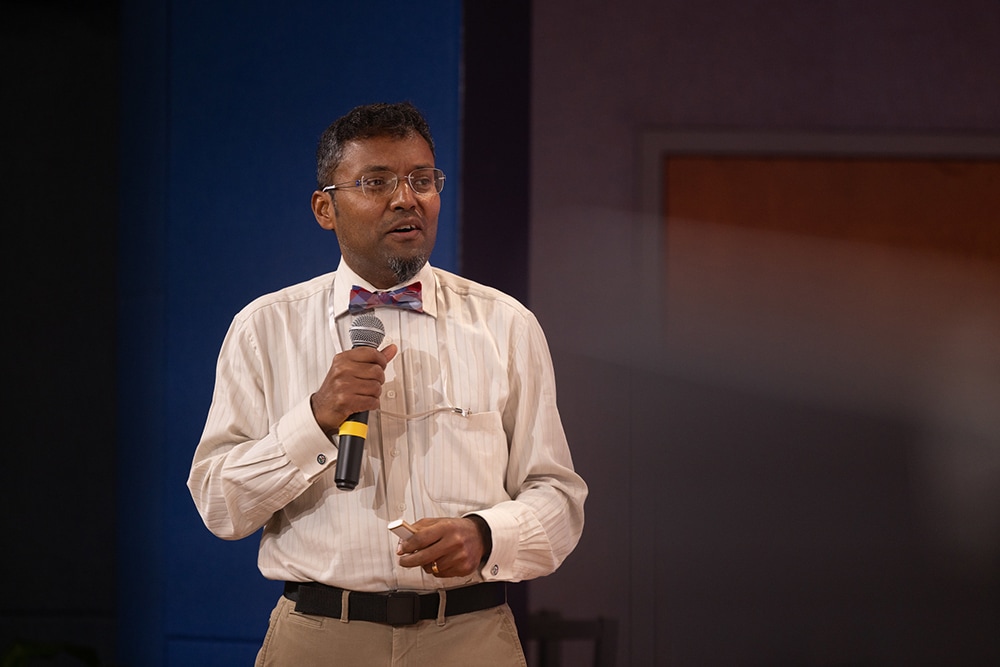
Adventist media experts poured out their knowledge and experience during the Inter-American Division’s Communication Summit or CommSummit, held in Miami, Florida, United States, November 7-8. The two-day event, which included presentations, short talks, and panel discussions, focused on the use of technology for mission and the use of cinematography to share stories, as well as celebrating creativity and storytelling.
Innovative Technology for Mission
Daryl Gungadoo, director of Adventist Review Media Lab, discussed innovative options to use the newest technologies for mission, including new ways of sending data from point A to B. “Currently, we depend on our Internet service providers,” he said. “New research is exploring how to use split photons instead … What it means is that we might be able to communicate across the world without Internet service providers.”
Other advances that Adventists need to consider and reflect on are the new frontiers in artificial intelligence (AI), which is now being applied for services such as design assistants, social media assistants, writing, and image generation, among many others. Gungadoo also mentioned companies that are exploring methods for adding electricity to our brains to enhance human functioning and increase the brain’s storage capacity; the implications of the trust economy, which includes services such as Uber but also Kickstarter and others; and the impact of hybrid media.
Gungadoo explained that in the past, media has been very linear, but it’s now following a hybrid model. As an example, he used a recent production in Morocco, where the key was not how they shot the film but how they dealt with the content and technically repurposed it. “By using an 8K 360° camera system, we don’t only capture the image but also what is around,” he explained. “In that way, we can reposition our cameras after we have shot the scene. And those images are not processed in a regular video-editing suite but in a gaming engine suite.”
The hybrid model also allows creators to insert 3D images into scenes for special effects, such as adding computer-generated lions into the scene of Daniel in the lions’ den, Gungadoo explained. The filmed content can also be digitized and turned into a cartoon, games, augmented reality, and virtual reality options, he said. The technology has led to a new game, Babylon Quest, that is scheduled to be launched at the North American Division Camporee in August 2024.
Gungadoo also shared how Adventist Review Media Lab is recording new shows and programs on a green screen that is then applied to virtual studios, which reduces costs dramatically, he said. Other innovative approaches include incorporating augmented and virtual reality to the study of the Sabbath school lesson, or to create content to share the Adventist message.
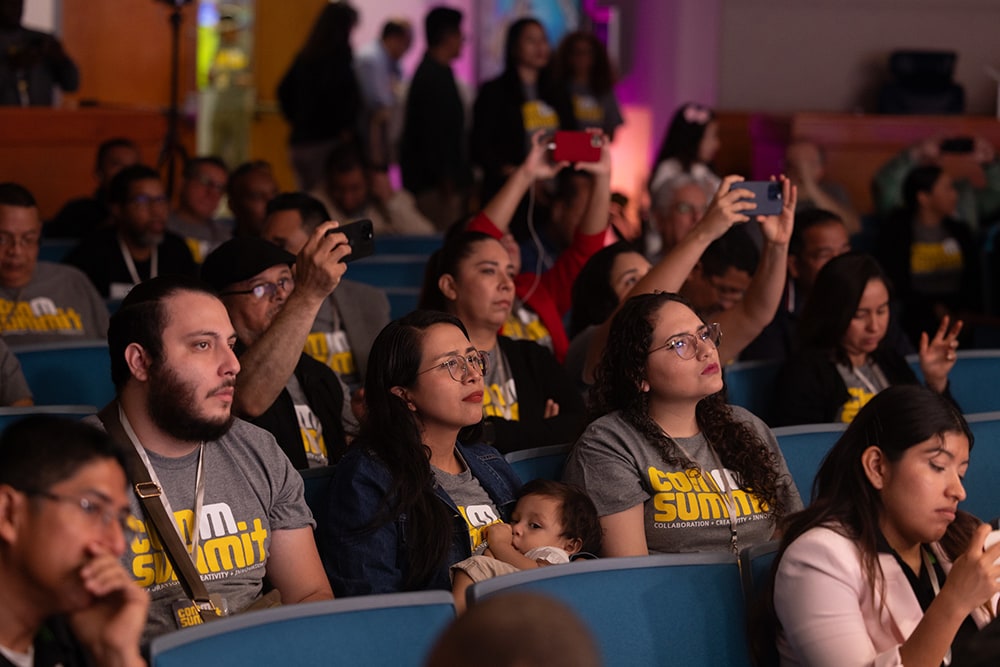
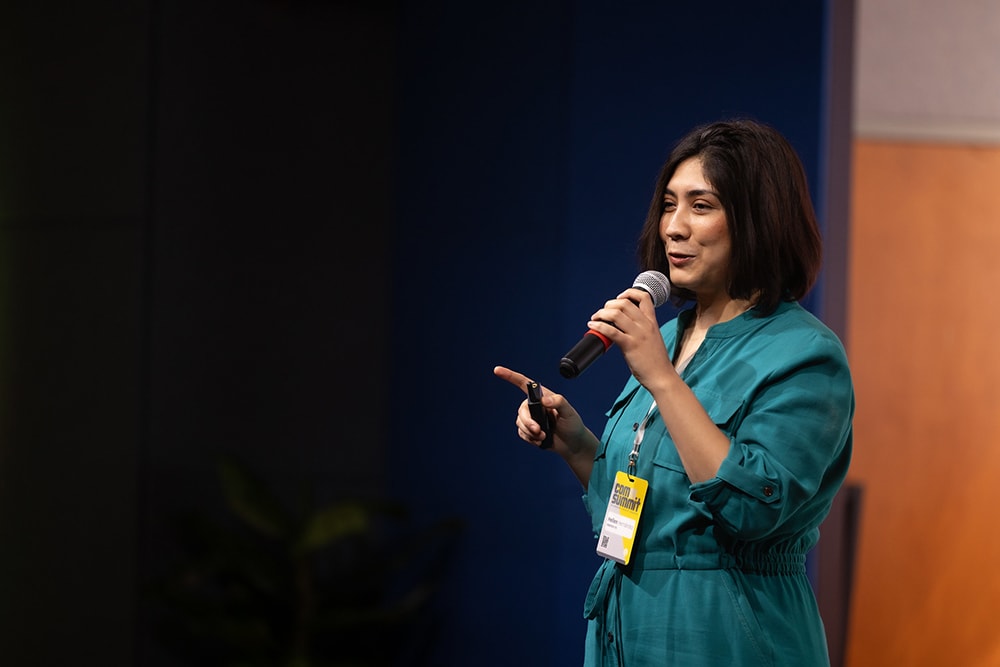

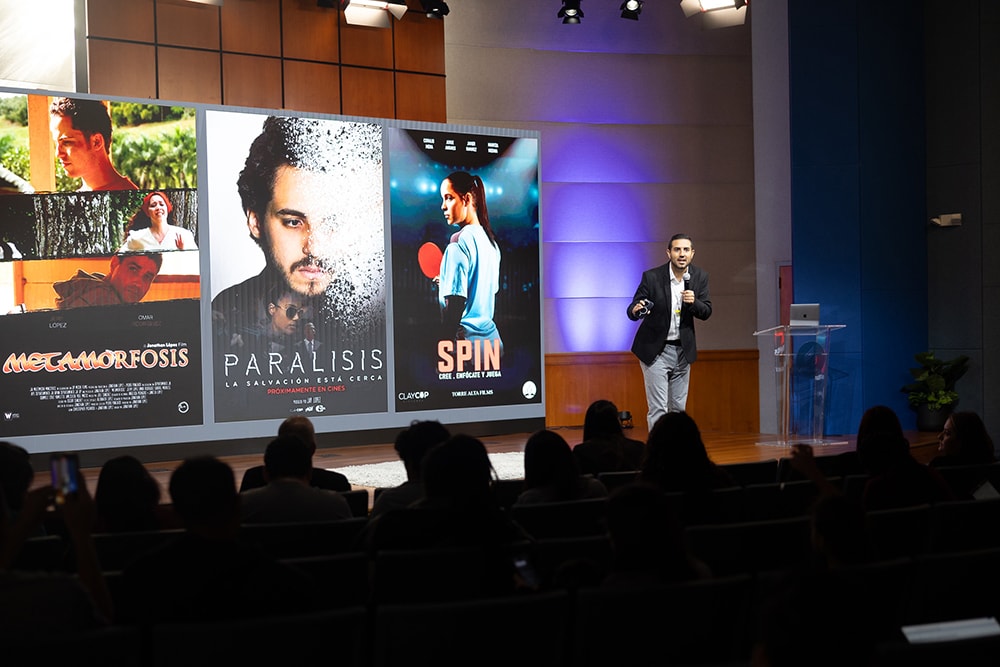
Using Your God-given Potential to Create
Another presenter on November 8 was award-winning and Creativo 115 studio director Hellen Hernández Castro. “Stories have been always part of our lives and culture,” she said. “Things have changed, but the basis has been always the same. Even Jesus used stories to discuss the most significant topics. Cinema is my preferred methods for telling stories.”
Hernández shared how her first trip to a cinema was to a venue where Mark Finley was preaching. “Some people went to the stage and prayed, ‘Thank you, Lord, for helping us using the evil space for a good cause,’” she said. “I found that kind of prayer very uncomfortable.”
Hernández shared how people were moved when she premiered her first short production when she was just 16 years old. “There, I found out how powerful stories on a screen can be,” she said.
After graduating from Montemorelos University in Mexico, Hernández launched Creativo 115. She was also accepted to a top school in Mexico City, into an exclusive program that would only take 15 students a year. There, facing stiff competition and classmates with much more experience, Hernández had to learn and relearn what she thought she knew. That initial shock, however, led her to realize some of the advantages she had, including the skills acquired thanks to her church musical and Pathfinders Club background. Church members and the church organization have always supported the logistical aspects of their productions, she said.
Another advantage, Hernández explained, is that creative people usually seek to get in touch with their spiritual side, something that they try to achieve by various means, not all of them healthy. “Sometimes, we are not aware of the advantage we have in being able to talk to God so easily,” she said. “Asking Him what He wants me to say and what is the message He wants me to share. I think it is a great advantage.”
With these great advantages there also comes a big responsibility, she said. “God has given you dreams, talents, and you are not using them in the right way, we are almost committing a sin,” she said. “It is the task of everyone of us to inspire the new generations to create, to awaken that creativity as we prevent them from wasting their potential.”
The Power of a Plot Twist
Another Adventist working in cinematography is Puerto Rican media producer Jonathan López, who discussed some of the challenges and opportunities the ministry offers church communicators.
“How many of you have ever felt [like] an underdog?” he asked. “It has happened to me. But let me just say first that in Jesus’ hands, we are not a finished product.” What is more, he added, “If you are working in church communication and feel that you have made it, you will probably have to change your vision completely about what it means communicating Jesus.”
Over the next few minutes, López discussed the effect and power of a plot twist in his own life.
López shared how he studied biology with the goal of working in sports medicine. God, however, led him to a different path that allowed him, just three years later, to launch his first cinematographic production. “God led me to understand that His plot twist in my life would not only impact my life but helped impact the life of others,” López said.
He shared some of his early experiences where he was able to see how God was leading and felt certain there was a calling from God in that area. “Evangelistic cinema does not begin at school; it’s a calling,” López said. “It starts with a fire inside of us. It is a fire that some will never be able to understand or explain.”
That calling does not reject training and education, but it understands that there’s a higher aim. “Prepare all that you want and are able to, but please understand that Jesus called you to something specific that He might not have called everyone to do,” López said. “I hope that the plot twist God may want to write with your script is unique and specific for the community where He allowed you to live.”
In that sense, López told Adventist communicators that they were not attending the CommSummit to network, “so one day you can become a communication director. Yes, you can dream, but you are here because you have been called by heaven,” he said. “And that call sometimes wakes you up at night and makes you uncomfortable. It is the call that pushes you to take risks to give it all for Him.”
In López’s case, his calling prompted him to produce the movie Spin despite lack of funds and other challenges. “Along the way, our calling will be tested,” López said. “But the One who called you, will lead you so you can get what you need.”
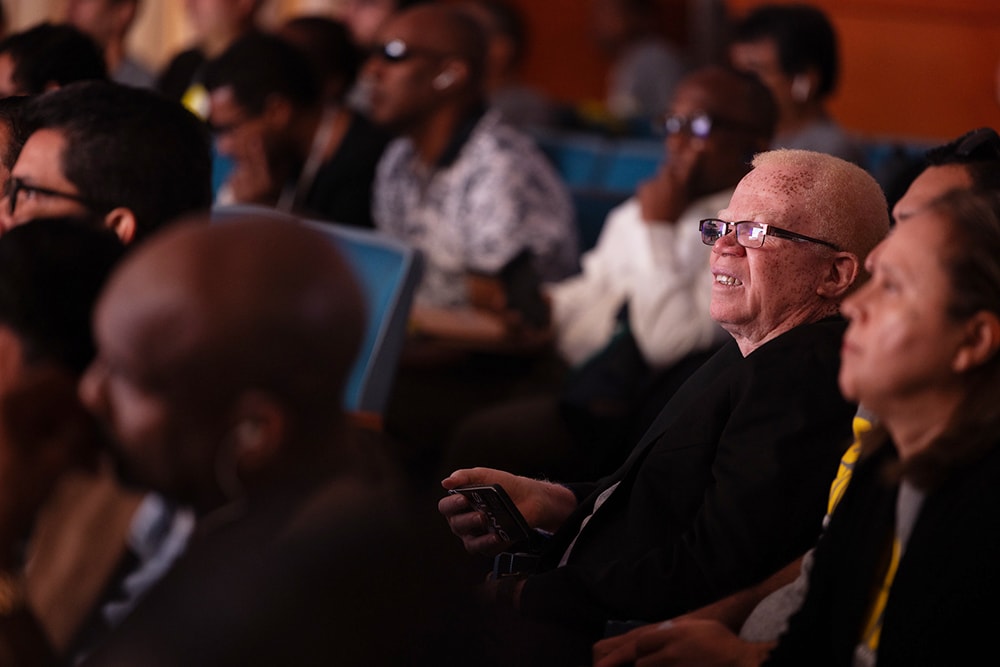
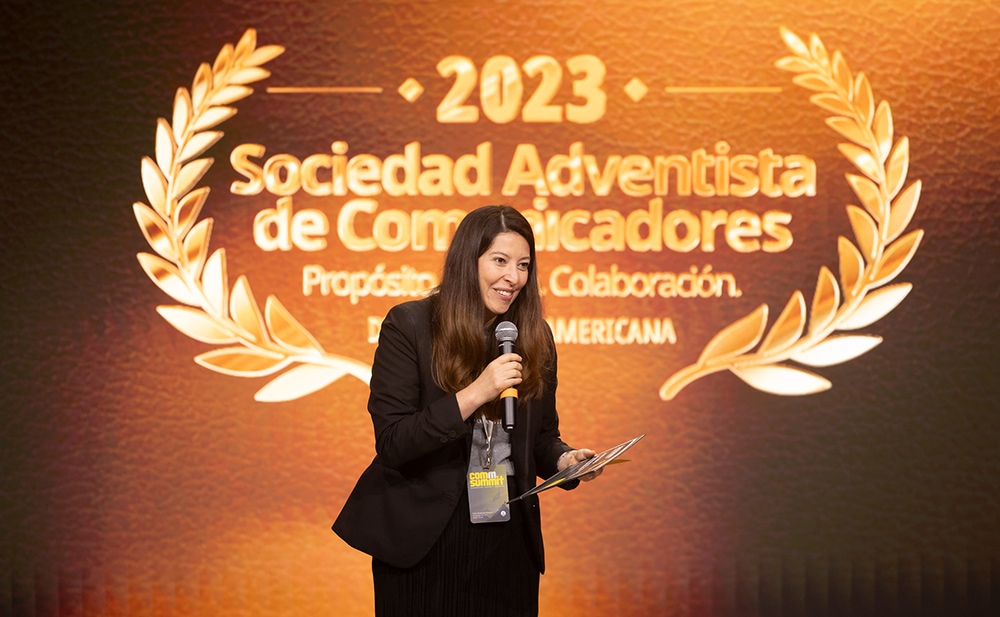
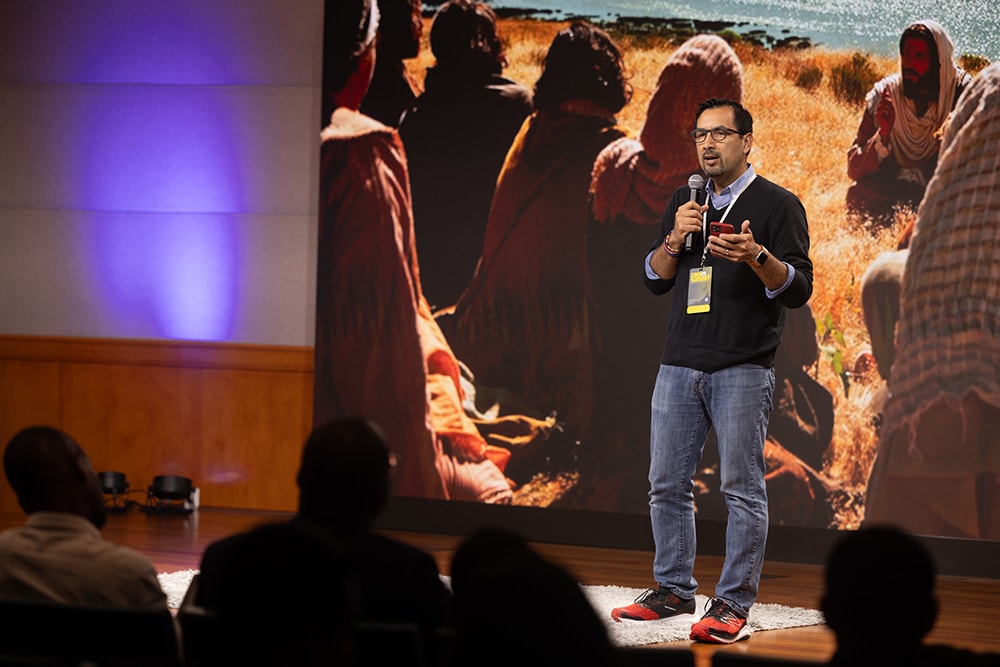
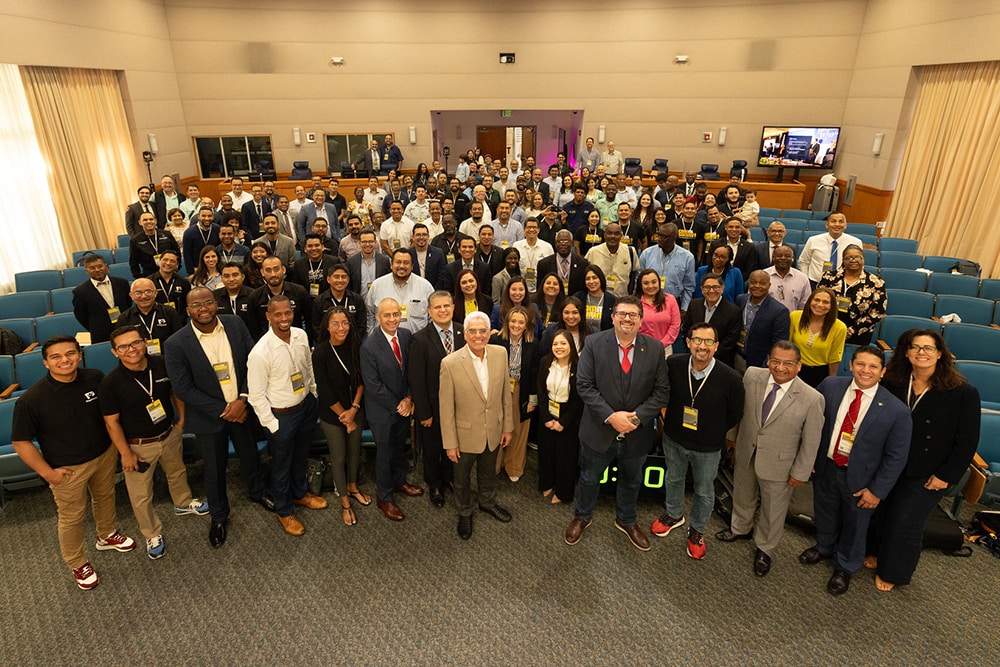
Celebrating Creativity and Storytellers
A day before, Julio Muñoz, North American Division associate communication director and Sonscreen Film Festival executive director, provided a rationale for creative storytelling as reflected in filmmaking.
“When we create, it’s a gift from God, because in the beginning, He created,” Muñoz said. “So, he created us to create as well, to tell stories. And storytelling is how we connect, how we build community.”
Muñoz shared how filmmakers are contributing to tell “those visual stories that are creating modern-day parables.”
Storytelling, Muñoz acknowledged, is what human beings have used to share culture, tradition, and history, and is also the way we shape our values and our beliefs. “Stories share information that creates an emotional connection,” he said. “We make sense of our lives and the stories that we tell and that we learn.” He added that “stories have the ability to help us learn about one another, to find understanding and empathy.”
Against that background, Muñoz said, cinema filmmaking has been defined by some experts as “the literature of the 20th century.” It allows for telling parables, not unlike what Jesus did when He lived on this earth. “Parables allow us to connect with audiences that we’d otherwise miss.”
It is what Muñoz and his team have been trying to do at the Sonscreen Film Festival, which was launched by Jerry Wallick in 2002. “We work with young filmmakers who are trying to find ways to tell those modern-day parables in a medium where they can hold people’s attention,” Muñoz explained. “It is a medium that we have not yet used effectively but should.” In 2023, the festival drew more than 250 filmmakers.
Through the years, Sonscreen has helped students to not only express what they feel and share their stories but also find jobs in the field, as several attested. Through partnerships with various world divisions, projects help create content with outreach and educational purposes. “We are touring around, connecting with new audiences that are not traditional, those who would not have otherwise heard who we are and what we want to share with them,” Muñoz said. “We have young people that are eager to find new ways to connect with new audiences. So, let’s support our creatives. Let’s not be afraid of the unknown. Let’s empower our storytellers.”
The original version of this story was posted on the Inter-American Division news site.